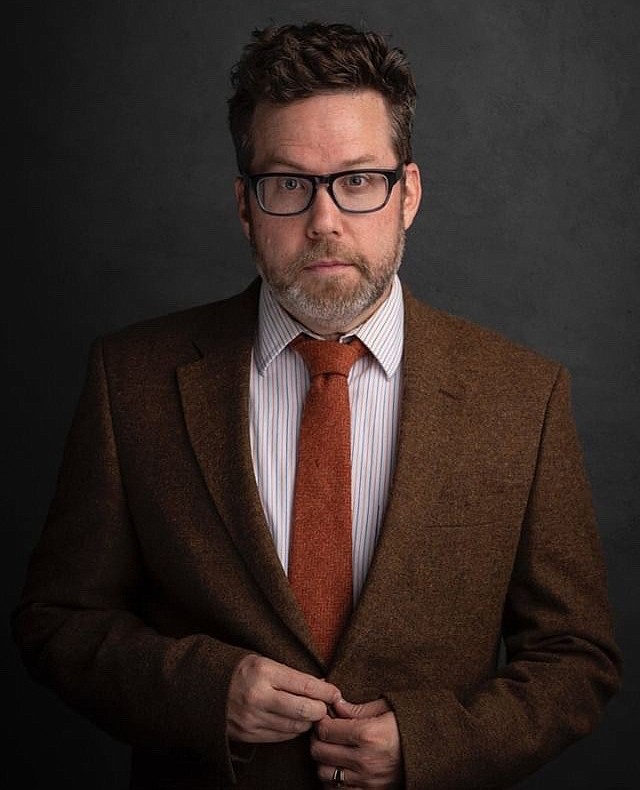- April 30, 2025
-
-
Loading

Loading

Sean Daniels is an actor, a director, a playwright and a recovering alcoholic. His latest play, “The White Chip,” takes a walk on the funny side of his recovery. It’s part of Florida Studio Theatre’s Recovery Project and now playing at FST Stage III, where it is being directed by Aaron Munoz. "The White Chip" is also running in New York City with an all-star cast.
Daniels is proud of that. But he grew up in Bradenton and his mother still lives there. Bringing this play back home is another source of pride. In the following talk, he shares why.
It’s both. My play is definitely autobiographical, though it didn’t take place in 40 minutes with just three people. I based it on my true story, but combined people and compressed events to make it work on stage. To paraphrase Oscar Wilde: “Everything I write is true, even the stuff I made up.”
I finally hit bottom. I could go without drinking for a few hours — then I just couldn’t make it. I'd been fired from work, my wife had left me and I’d crashed my car. It’d been so long since anybody smiled when they saw me coming. I finally had enough.
I thought about taking my own life. But I called my mother instead. It was her one-year anniversary of getting sober. I figured she’d have the answer — and she did. She got me through that evening; then she got me into a rehab center in Jacksonville, Florida. After that, I connected with a group of sober Jewish men who met a few times each week. They’re the reason I finally stayed sober. I’d never met anyone like them in the recovery community.
They really knew the science of alcoholism — and they were excited to explain it to me. Their scientific attitude was completely new to me. Recovery circles are generally religious. I’d been trying to get sober for nearly two years at various other programs. I’d been in hundreds of AA meetings! People talked about the higher power. The science aspect never came up. Brain chemistry and dopamine and neural pathways? The importance of genetics? Nobody talked about that. But these gentlemen did. The knowledge they shared is how I finally kicked it.
Exactly. After my recovery, I tried to find a play that touched on the science of alcoholism. What I found was lots of old-fashioned dialogue, heavy-handed messages, no sense of humor and zero science. The play I was looking for didn’t exist. I realized I had to write it.

Because that’s the kind of play I’d want to go to. But a morality play about the evils of drinking? Who wants to go to that? I grew up in the Eighties and I watched all those boring after-school specials on TV. No comedy, just serious, serious problems. “A very special person struggles with …” whatever. I hated that stuff. I can’t understand a world without comedy.
Absolutely! Death, suicide, addiction and alcoholism — they’re all laughing matters. At the worst funeral, everybody’s waiting for an excuse to crack up, because they need that release. Alcoholism’s a serious problem, yes. You might go to a play that makes you laugh about it. If the poster says, “The White Chip: This Is a Serious Play about Addiction,” that’s three reasons not to go in one sentence.
On the individual level, showing the path to recovery. That’s been happening in our New York production. After every single performance, somebody comes up and says, “OK. I’m ready to get help.” On a cultural level, I’d like to help change the national narrative about alcoholism, addiction and recovery.
Art can do that. Back in the 1980s, plays like “Angels in America” changed the national narrative around HIV. Art helped people understand that the disease was a medical crisis, not a moral failing. Art can create the same understanding about alcoholism.
We’re kind of like a traveling road show. We use the performing arts to raise awareness and fight the stigma surrounding addiction and recovery. But our model is continually evolving. We’ve partnered with Live Tampa Bay, an organization dedicated to reducing overdose deaths across the region. It’s another way to redo the national narrative.
In many AA meanings, it means that you’ve decided to stop drinking. You can be drunk and still get your white chip. It’s a sign of your intention, not an achievement.
You’ve got to start somewhere.